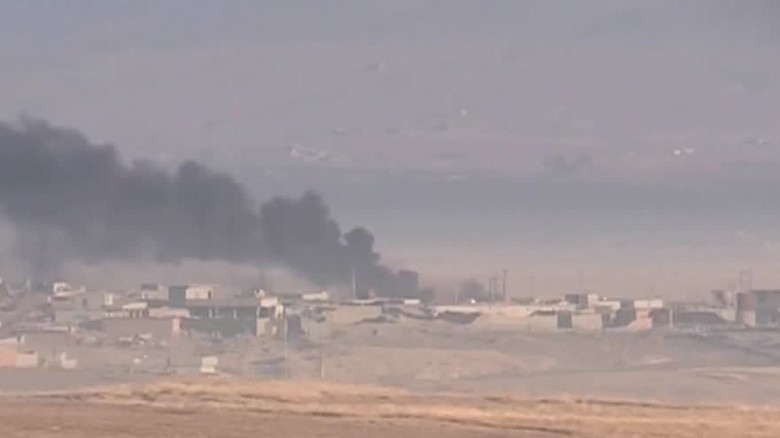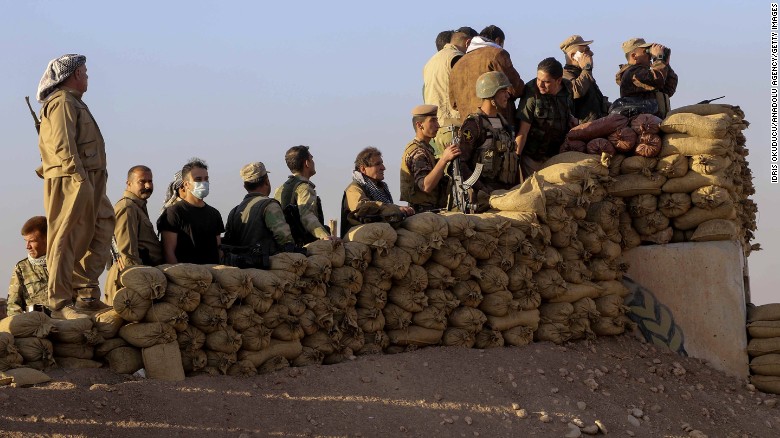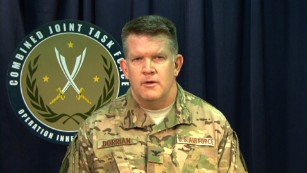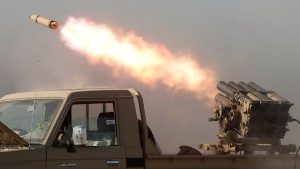Battle for Mosul begins with gunfire and car bombs
Two years ago, Iraqi soldiers in Mosul threw down their weapons and fled the city in terror as armed militants overran the streets under the banner of the emerging threat of ISIS.
On Monday, invigorated Iraqi forces and their allies started back down the road to Mosul to try to reclaim the largest city under ISIS control and its last remaining stronghold in Iraq.
The forces got a taste of what's to come.
The 94,000-member Iraqi-led coalition greatly outnumbers its opponents and has the benefit of air support from roughly 90 coalition and Iraqi planes.
Why the battle for Mosul matters in the fight against ISIS
But, if Monday is any indication, "ISIS is showing that it's very willing to put up a fight," CNN's Nick Paton Walsh said.

Battle to liberate Mosul begins
'Staggering scenes'
Intense gunfire and suicide bombings marked the first 24 hours as forces made their way toward Mosul.
ISIS deployed suicide car bombers throughout the day Monday, CNN's Arwa Damon said from near Mosul.
Paton Walsh, who is embedded with a Peshmerga convoy near Mosul, said he saw "staggering scenes" as forces advanced toward the city, with sporadic fighting erupting as they encountered ISIS fighters. ISIS attempted to drive suicide car bombs toward the Peshmerga convoy several times during the advance.
ISIS' terrible weekend: 3 major setbacks in 3 countries
Paton Walsh was caught in an exchange of gunfire as he was filing a dispatch. Paton Walsh and his team, the first Western media outlet to travel along the road into Mosul during the offensive, were unharmed in the exchange.
But on the whole, Peshmerga commanders encountered less resistance than they expected, he said.
Elsewhere, Kurdish Peshmerga forces, which are playing a key role in the offensive, cleared nine villages in an area measuring approximately 200 square kilometers. Forces east of Mosul also secured control over a significant stretch of the Erbil-Mosul road, a key strategic road, the General Command of Peshmerga Forces of Kurdistan Region said.

Peshmerga forces stand guard at Kargali village during an operation to liberate Mosul.
For now, violence is limited to the villages on the city's outskirts. But the coalition is expected to encounter fierce resistance from thousands of ISIS fighters in Mosul's urban center, armed with car bombs and improvised explosive devices.
The battle, which could last months, will be "a hard fight," said US Army Maj. Gen. Gary J. Volesky, the top anti-ISIS coalition general in Iraq. "But the Iraqi security forces are ready."
Diverse coalition
Before ISIS seized Mosul in June 2014, the oil-rich city had more than 2 million residents. Today, about 1 million residents of the once-diverse city remain.
For ISIS, the capture formed a vital part of its self-declared caliphate across swaths of Iraq and Syria, in addition to assaults on Ramadi, Tikrit and Falluja. One by one, in the past two years, coalition forces have reclaimed those cities.
US military officials have estimated up to 5,000 ISIS fighters are in Mosul, but the terror group's supporters say there are 7,000.
A diverse coalition of as many as 100,000 troops will play a role in the operation, although not all will be directly involved in the assault on the city. Some will secure positions behind the front lines or play other supporting roles.
The force includes 54,000 members of the Iraqi Security Forces and 40,000 Kurdish Peshmerga fighters. It also involves 14,000 members of paramilitary units -- 9,000 Sunni fighters, and 5,000 from other minorities including Christians, Turkmen and Yazidis. Shia paramilitaries will not be involved in the assault on Mosul, but will be tasked with securing areas around the city instead.
Only Iraqi army troops and members of the national police force will enter the city of Mosul, Abadi said, amid fears of sectarian retribution during the operation.
The Pentagon, which has lent advisers and air support, has earmarked about 500 of its nearly 5,000 service members in the country for the mission. Most are working on logistics, although there are also special operations forces among that number.
Who's involved in the Mosul offensive?
54,000: Iraqi security forces
40,000: Peshmerga forces
14,000: Paramilitary units*
500: US forces, mostly for logistical efforts
*The paramilitary units include Shiites, Sunnis, Christians, Turkmen and Yazidis. Shiite members are assisting with, but not participating in, the Mosul offensive.
How the battle for Mosul could unfold
Setting fires to defend itself

US: ISIS has built 'elaborate defenses' in Mosul
ISIS militants have taken measures to combat coalition airstrikes.
Plumes of black smoke rose from burning oil-filled trenches outside northeastern Mosul, an attempt by ISIS to obscure its fighters' positions during airstrikes, military sources said.
Still, one airstrike hit one of Mosul's main bridges.
But retired US Brigadier Gen. Mark Kimmitt said the advantage of the Iraqi military's airpower would be nullified when it came to block-to-block fighting in Mosul's urban center.
Improvised explosive devices would likely play a major part in the city's center, he said.
What happens after ISIS loses Mosul?
Outside Mosul, ISIS claimed responsibility for a suicide bombing at a military checkpoint in southern Baghdad that killed 10 people and wounded 17 on Monday, a security source said. The victims included civilians, soldiers and police.
Humanitarian crisis looms
Mosul's residents remain in the clutches of a terror group known for exploiting civilians as human shields. Airdropped leaflets told residents to tape up their windows, disconnect gas cylinders, and stay indoors.
The UN's Office for the Coordination of Humanitarian Affairs estimated that up to 1.5 million people could be affected, with civilians in Mosul facing potential threats from sniper attacks, booby traps, crossfire and explosives.
Humanitarian crisis looms amid Mosul offensive
It could lead to the largest humanitarian operation of 2016, said Lise Grande, UN Humanitarian Coordinator in Iraq.
The United Nations is building 22 sites to house an estimated 400,000 Iraqis fleeing the conflict in early days, Filippo Grandi, the UN's High Commissioner for Refugees said in Baghdad on Monday.
News Courtesy: www.cnn.com











